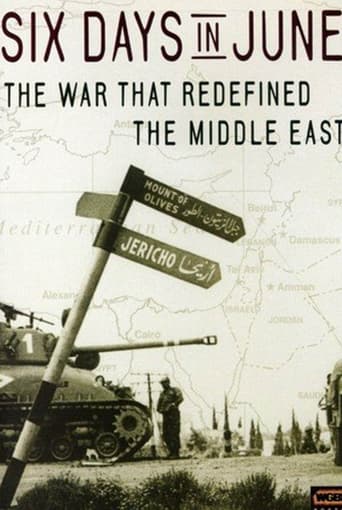

This DVD is taken from the WGBM production directed by Ilan Ziv. It is admirably objective considering that Ziv was born in Israel and fought in the Yom Kippur War of 1973. He came to the US and graduated from New York University's film school soon afterwards.The film consists of interviews with soldiers and politicians from both the Arab and Israeli side along with footage shot during the war. I say the film is "admirably objective" but of course there is no such thing as absolute objectivity in such matters, and I am sure that Arab viewers will find the production disagreeable. This disagreement may stem largely from the fact that the Six Day War in June, 1967 was an unmitigated disaster for Syria, Egypt, Lebanon, and especially for Palestine.However, Israel's swift and decisive victory brought with it no lasting peace. It did however humiliate the Arabs who imagined that they should be able to defeat such a tiny nation as Israel with Allah on their side and great leadership from Egypt's charismatic President Gamal Adbel Nassar and Jordan's King Hussein. To save face Arab leaders have done two things. One, they have inculcated the faithful with the notion that Israel won only because the US and other allies helped them; and Two, they have refused to acknowledge defeat holding onto the notion that the war is not over and that the Arab nations will yet achieve victory.Ziv's film emphasizes the political nature of the conflict, revealing the thinking of leaders on both sides, showing how Moshe Dayan assumed a position of power and influence just prior to the war and how Nassar deluded himself (or was deluded by his military people) into thinking the combined forces of Egypt, Syria and Jordan could defeat the Israelis. In the United States President Lyndon Johnson was advised by his military people that if the Israelis struck first they would win in a week or so, if second, it would take them perhaps two weeks. Johnson remarked (at the time mired in Vietnam) that his generals did a great job of analyzing prospective wars in which they would not be involved, or words to that effect.Ziv reminds the viewer that the war could have escalated into a much wider conflict, possibly bringing in the Soviet Union on the side of the Arabs and the US on the side of Israel. Some teletype messages between Soviet Premier Aleksei Kosygin and Johnson are recalled.Some facts gleaned from the film: Israel struck first with well-timed, precision bombing of Arab airfields so that the Arab states were left with no air power. The war was, effectively speaking, over then within hours of its start. However, when the report of the air disaster reached Nassar, instead of seeking peace as fast as possible, he ordered propaganda broadcasts repeat with fictitious "victories." Black and white film clips show the Arabs in jubilant celebration. How cruel it was when the truth came a few days later.Israeli's preemptive first strike was prompted by the military build up by Egypt and Nassar's closing of the Strait of Hormuz, which most authorities consider an act of war. The film strongly suggests that if Israel had not acted first it would have suffered many more casualties, especially from Arab air power.And then there is the famous phone call from the Arab states that never came. The Israelis were willing to trade land for peace, but the Arabs decided to pretend that the war would continue and so they did not negotiate a peace treaty. The reason the actual fighting ended is because the super powers and the United Nations demanded that Israel halt its advances.There is some almost nostalgic footage of Moshe Dayan, Israeli's heroic Defense Minister who led the armed forces to victory, and some of indecisive Prime Minister Levi Eshkol. Ziv recreates the story of their difference of opinion on what Israel should do and how Dayan's position prevailed.The real losers in the war have turned out to be the Palestinian people who have been under occupation since the war ended. The Arab states that were instrumental in bringing about this human tragedy seem content to blame Israel while doing nothing substantive to help the Palestinians. Indeed a significant portion of the terrorism directed at Israel and the West is motivated by spiteful spasms of revenge by Arabs who are desperate to somehow erase what they see as a humiliating defeat. How much wiser it would be to realize that what happened in 1967 reflects not at all on the manhood of anyone living today, or even then for that matter. Israel won because it could not lose. "Manhood" and heroic acts of valor or lack thereof have nothing to do with it.Sadly, as many others have noted, Israel may win all the battles and all the wars and yet never achieve peace. Theirs is an unenviable position. As long as they exist in the midst of Arab nations who hate them and teach their children to hate, they will always be on a military footing. Only when the old hatreds die, some many years from now, will there be lasting peace in the Holy Lands.(Note: Over 500 of my movie reviews are now available in my book "Cut to the Chaise Lounge or I Can't Believe I Swallowed the Remote!" Get it at Amazon!)
... View More